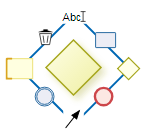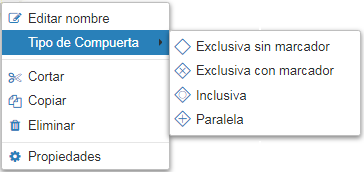Gateway
A gateway is incorporated into the model to determine whether the data flow routes within a process branch or merge depending on the definition of conditions.
"Gateways are used to control how sequence flows interact as they converge and diverge within a process" [Workflow Management Coalition]
An exclusive gateway is where only one of the exit paths continues with the task sequence.
Gateways have two representations, although both have the same behavior. By convention, the same representation must be used for the entire definition of a process.
- Exclusive gateway without marker.
- Exclusive gateway without marker.
The possible exit paths of the gateway are set by selecting one of the following options:
•Definition of conditions
Conditions are defined for gateway outflows, which are evaluated sequentially. When a condition is met, the process continues along this path, without evaluating the remaining conditions.
•Button definition
Buttons are defined for gateway outflows. When users press a button, the process continues along that path.
The exclusive gateway must have an output flow defined as default so that the process can continue when no conditions are met.
|
|
It is used to create parallel paths and synchronize activities. All exit paths are activated without evaluating the conditions.
Parallel gateways can be defined in pairs, one as a divergence element to activate several parallel paths simultaneously and the other as a convergence element to synchronize previously activated paths. In the latter case, when the gateway is used for synchronization, the output is activated when the input paths are completed, that is, all activities preceding such point have ended.
The output flows of a parallel gateway do not require definition of conditions, since all exit paths must be completed.
It is used to activate one or more paths and synchronize activities. All output flow conditions are evaluated.
Inclusive gateways can be defined in pairs, one as a divergence element to generate parallel activities and the other as a convergence element to synchronize previously activated paths. For divergence, at least one exit path must be activated, while for convergence, all activated paths must be completed.
•Definition of conditions
Conditions are defined for inclusive gateway output flows. All conditions are evaluated and the process takes all the paths where conditions are met.
•Button definition
Buttons are defined for gateway output flows. When users press a button, the process continues along that path. The same button can be defined for more than one flow.
An inclusive gateway is recommended to have an output flow defined as default in order to prevent execution errors, when no flow condition is met.
Pie Chart Menu

|
Opens an area for editing the name. |
|
Deletes the gateway. |
|
Adds an activity. |
|
Adds a gateway. |
|
Adds an end event. |
|
Adds a flow. |
|
Adds an intermediate event. |
|
Adds a comment. |

- Edit name: Opens an area for editing the name. Same functionality as the icon  .
.
- Gateway Type: Defines the type of gateway.
- Cut: Deletes the selected gateway. It can be pasted in another process location.
- Copy: Copies the selected gateway. It can be pasted in another process location.
- Delete: Deletes the selected gateway.
- Properties: Opens the property panel to show and/or modify.












